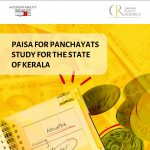
Is Decentralisation Relevant for the Future?
17 June 2020
In a powerful and elegant paper written in the mid-nineties, titled, bluntly, ‘The Dangers of Decentralisation’, Remy Prud’homme made a strong case to be conservative when dealing with how much power and responsibility should be devolved to local governments. At that time, the paper ran counter to the popular drive towards greater decentralisation; pioneered in Latin America and advertised and sold with great enthusiasm by multilateral agencies across the developing world in Asia and Africa. Prud’homme’s paper makes interesting reading, and it would be useful to revisit some of the arguments he made then, in the light of today’s governance imperatives and challenges.
It may be simple to assume that here was a conservative and opinionated person raising the usual suspicions about decentralisation; that it weakens power and centralised control. However, Prud’homme did exactly the opposite. He first placed down the assumptions of what he considered to be the ‘typical decentralisation model’, then proceeded to analyse whether these assumptions were generally true of the modern world, and went on to test decentralisation (as he assumed it to be) against the imperatives of good governance.
Prud’homme’s primary assumption was that the vision of champions of decentralisation was to aim for a ‘pure’ form of it, where local governments raise pure local taxes and undertake pure local expenditures without the benefit of central government transfers. He went on to analyse how ‘pure decentralisation’ impacts redistribution, stabilisation and allocation.
With respect to the impact of decentralisation on redistribution, Prud’homme observed that poverty is both regional and individual. Thus, he said, the poor who live in well-off regions will do better than the poor in poorer regions. In order to mitigate these inequalities between poor people, as also across poorer regions, income has to be redistributed not only to poorer people, but for area development of poorer regions; regional development cannot happen when only regional poor are helped. For all these reasons, Prud’homme concluded an effective redistribution programme can only be run effectively by a higher level government.
The counterfactual to this approach is to suggest that local redistribution could be driven through a levy of higher taxes on the rich, who live in poorer regions. However, Prud’homme cautioned that such approaches will drive the rich away to lightly taxed areas. He also said that if all local development were to be driven only by local taxes, there will be concentrations of high growth (such as in urban areas) and less balanced development. In poorer regions, money has to be spent to improve infrastructure and services without expecting an immediate return on that investment in terms of growth; and only a central government could have the reach, patience and staying power for that approach.
When it comes to stabilisation of the economy, Musgrave, popularly referred to as the father of public finance, felt that it is best run as a central responsibility. However, for central governments to effectively stabilise the economy by using fiscal policies to affect overall demand, its share of national taxes and expenditures must be sufficiently large in relation to total taxes and expenditures as well as to GDP.
It naturally follows that if tax handles are decentralised, then the clout of the central government to handle stabilisation measures dilutes to that extent. It is possible then, that when the central government is attempting to stabilise the economy by either stimulating or restricting expenditures, such efforts may not be synchronised with local government income and expenditure cycles. For example, local governments often try to raise taxes immediately after elections and drive expenditures, immediately before. This cycle may run counter to stabilisation measures adopted by a central government in the larger interest.
When it came to the issue of allocation efficiency, Prud’homme was even more forthright. He noted that the classical argument in favour of decentralisation is that different places have different preferences for services and allocation is more responsive when decentralisation is strong, but argued that he was sceptical about the validity of this assumption, particularly in developing countries, for the following reasons. First, he said, the assumption that various local jurisdictions have different tastes or preferences is wrong. In reality, the main differences are in household incomes and potential tax income. The priority in most developing countries is to satisfy basic needs, which are typically not too variable across jurisdictions and are well understood. Therefore, the potential welfare gains associated with a more nuanced match of supply and demand of local services are not large.
In plain speak, he meant that if more or less the same standards are maintained and achieved in the supply of basic services by a central government in developing countries, it is not worth the trouble of decentralisation.
Prud’homme also asserted that it is wrong to assume that taxpayers/voters of each jurisdiction express their preferences in their votes. Typically, local electoral behavior in developing countries are usually decided on the basis of personal, tribal, or political party loyalties. So local elections say little about local preferences and the menu of choices are unlikely to express the electorate’s preferences. Even assuming that local elected mayors will satisfy the preferences of people, on the strength of which they were ostensibly voted, they are unlikely to fulfill such promises because even if they wanted to fulfill it, they will be hamstrung because of a gross mismatch between available resources and promised expenditures.
Prud’homme had a lot to say about decentralisation and corruption, and the mismatch of capacities with responsibilities; both constant bugbears of governance even today. More of that in next week’s blog.
Also Read by the Author: Whither, Local Governments, in the Pandemic?






Good afternoon sir
This is Kaustav Dass from Amity University Mumbai.
I have dropped a DAM on your Facebook account.
Will be really grateful if you can revert back to me.
Thanks again